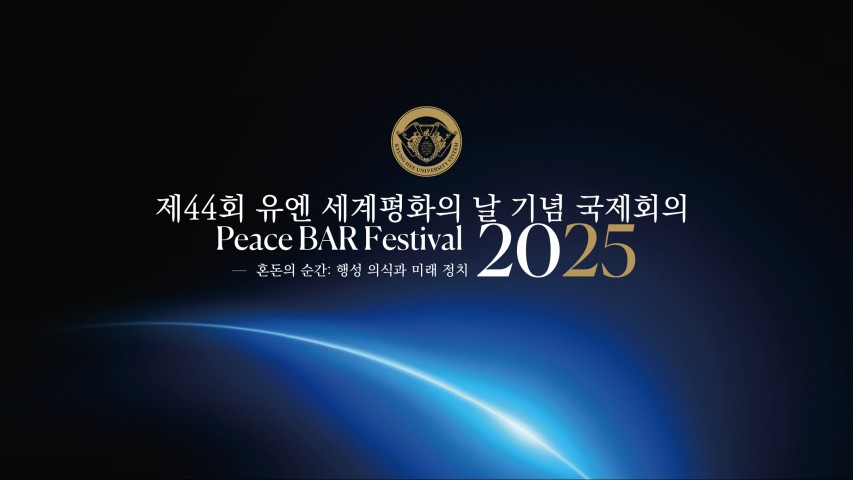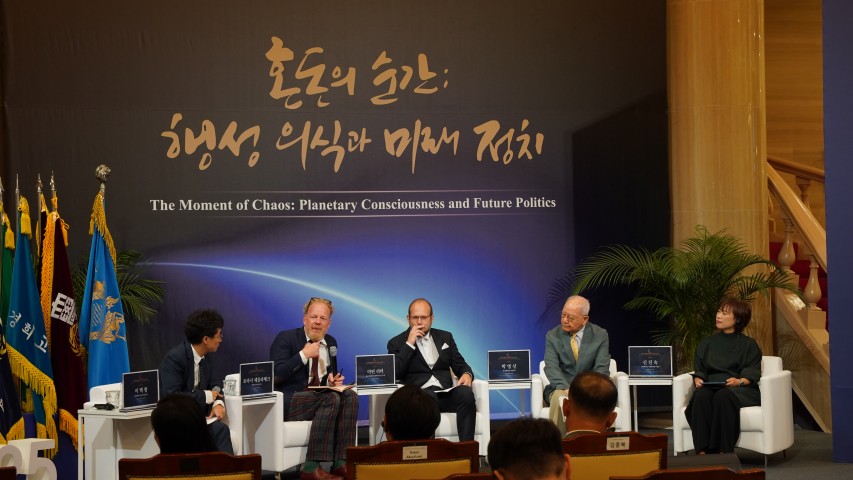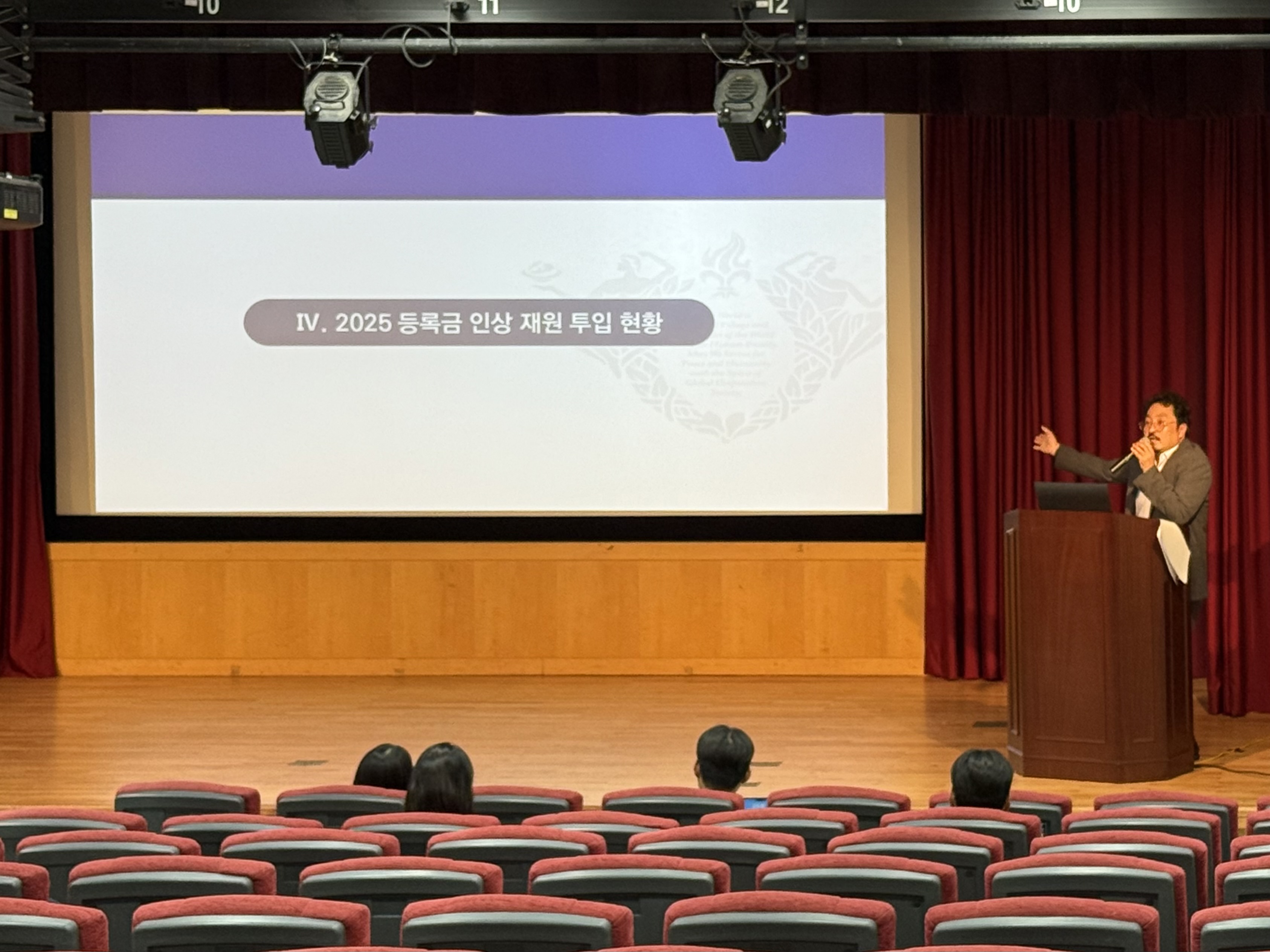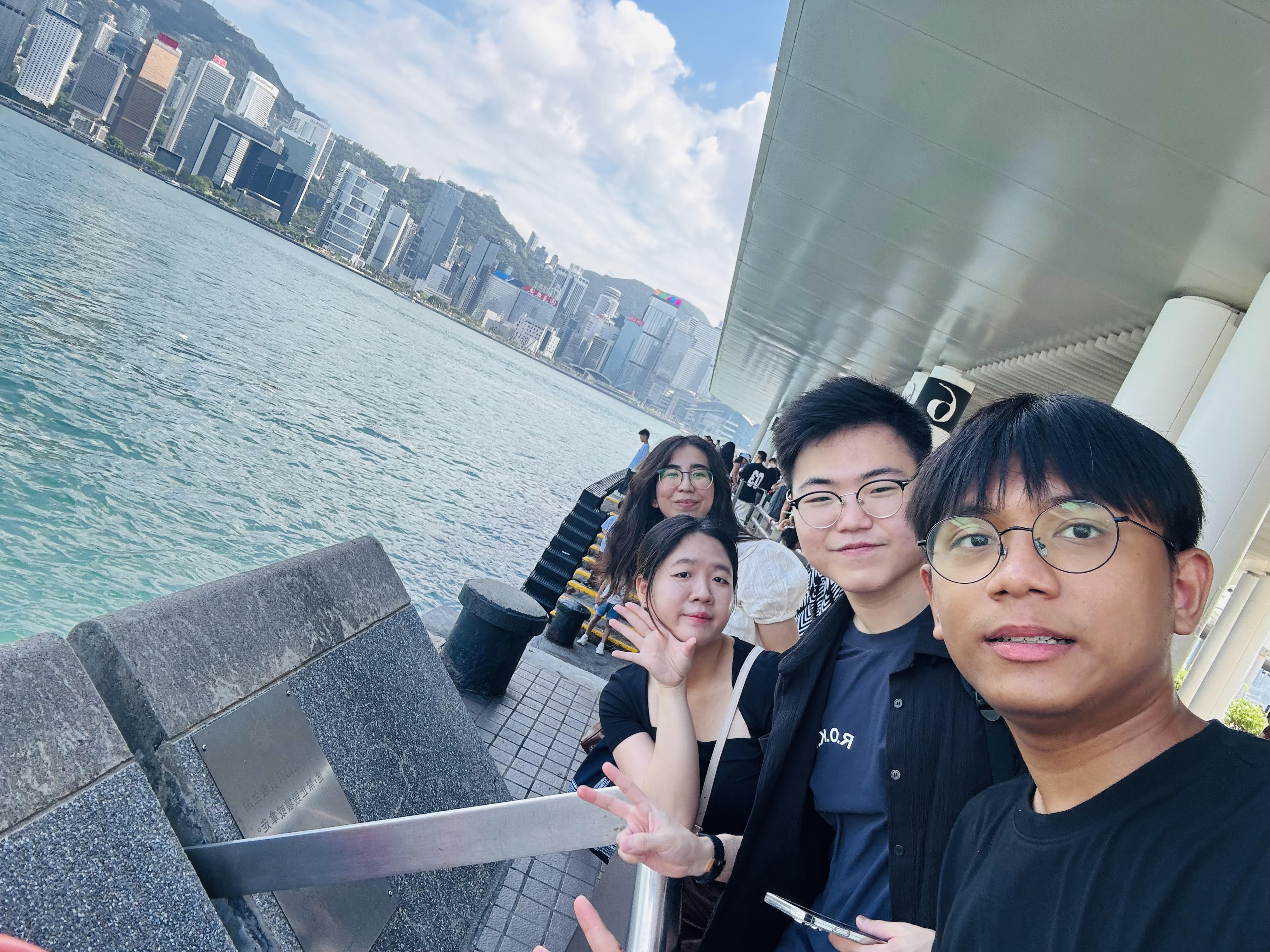[Campus] 2025 Peace Bar Festival: Shaping the Future Together
The 44th Peace BAR Festival (PBF) was held at Kyung Hee University (KHU) on September 19–20. Under the theme “Moments of Chaos: Planetary Consciousness and Future Politics,” the festival explored future politics and global community awareness in response to shifting world affairs and the climate crisis. Bringing leading scholars and experts together, the event sought pathways for civilizational transformation and encouraged wider participation from students and citizens.

The 2025 PBF was held under the theme‘Moments of Chaos: Planetary Consciousness and Future Politics.'
Photo: KHU (khu.ac.kr)
2025 PBF: Expanding Global Dialogue
PBF is an annual international event hosted by KHU to commemorate the United Nations (UN) International Day of Peace. Established in 1982 following the UN’s declaration of the International Day of Peace in 1981—an initiative first proposed by KHU’s founder, Dr. Choue Young-seek—the festival has a history spanning over 40 years dedicated to promoting peace, sustainability, and planetary citizenship. The acronym "BAR" stands for spiritually Beautiful, materially Affluent, and humanly Rewarding, symbolizing a vision of a future civilization.
The 44th festival took place from September 19 to 20 at Grand Peace Hall, expanding its thematic scope under the title “Moments of Chaos: Planetary Consciousness and Future Politics.” This theme reflects the complex global crises of geopolitical instability, climate change, and threats to democracy, emphasizing a shift toward planetary consciousness beyond human-centered perspectives.
In addition to deepening scholarly discussions, the festival broadened its participation to include a wide variety of attendees such as students, youth representatives, civil society leaders, and policymakers. Notable participants included Harvard professor Naomi Oreskes, Princeton’s John Ikenberry, former Norwegian Prime Minister Gro Harlem Brundtland, and Paul Shrivastava, co-chair of the Club of Rome. Their involvement highlighted the festival’s goal of bridging academic insights with practical political and social solutions to pressing global challenges.
World Leaders Deliver Messages of Crisis and Hope at PBF
The first day of the 44th PBF took place at the Grand Peace Hall to commemorate the International Day of Peace. The day featured the official commemorative ceremony for the International Day of Peace, a special panel discussion, the Havel Dialogue, and a roundtable session.
During the opening ceremony, Choue In-won, chairman of the Kyung Hee System, addressed the urgency of today’s complex global crises. He highlighted challenges such as climate change, the threat of nuclear war, and uncertainties brought by technological advancements. Emphasizing the need for a new shift in consciousness, he called on citizens to act with unity, accountability, and insight. He stated, “We must turn these crises into clear opportunities through collective responsibility and wisdom from all citizens.”
Harvard professor Naomi Oreskes delivered the keynote speech titled “From Global Society to Planetary Society: Charting a New Course for Future Civilization.” She emphasized the importance of global solidarity and participation through active listening. She stated, “Our planet is sending urgent warnings, but we have yet to truly listen.” She further stressed that “Participation is not just about speaking, but about listening and sincerely considering each other's perspectives.”
Following the opening ceremony, the special panel discussion featured Princeton University Professor John Ikenberry, former Norwegian Prime Minister Gro Harlem Brundtland, and Paul Shrivastava, co-chair of the Club of Rome. They engaged in an in-depth discussion on civilizational transformation and the future direction of politics.
Professor Ikenberry emphasized that a new international order based on trust and cooperation is urgently needed, and that restoring democracy is a critical task. Former Prime Minister Brundtland highlighted that political leadership for sustainable development is the most important challenge facing the current generation. Meanwhile, Shrivastava stressed that beyond technological innovation, a fundamental transformation of consciousness and value systems is essential.
The event also included the Havel Dialogue and roundtable sessions, which facilitated layered discussions on global citizenship, participation, and civic engagement. These dialogues served to deepen conversations around international peace and sustainability, highlighting the need for collective action and ethical responsibility.

The Havel Dialogue panelists gathered on the stage
Photo by Kang-keon , Lee Soo-in / The University Life
A Stage for Peace Shaped by Dialogue and Solidarity
The 44th PBF brought together scholars, citizens, and youth from around the world to seek solutions for complex crises such as climate change and future politics. It was a significant international platform for dialogue and action-oriented discussions.
Shin Jin-sook, Vice Director of the Future Civilization Institute, explained her participation, saying, “In one word, hope.” She added, “I joined to speak about the politics of hope. In these times filled with anxiety and hatred, I want to encourage individuals to write their own narratives of hope.” She further emphasized, “Speaking of hope in an age of despair is not a luxury but an urgent task.”
Park Si-yoon, a student from the Dept. of International Studies, shared her motivation for attending: “The theme of the festival was very intriguing to me.” She added, “I was curious about how one person’s mindset can positively change the world.” Reflecting on the Havel Dialogue, she said, “I gained a clearer understanding of ‘planetary citizenship’ and ‘planetary consciousness.’ I hope that even small changes in thought and action will be positively reflected on our planet.”
Participants widely praised the festival for bridging academia and civil society, especially inspiring the younger generation with a strong sense of responsibility and willingness to act for the future. In addition, various side events such as documentary screenings, photo exhibitions, and digital data clean-up campaigns actively promoted participation and spread peace culture among citizens and students.
The festival reinforced KHU’s critical role in advancing global peace and sustainability. As intertwined global crises escalate, the festival emphasized the urgent need for collective responsibility and transformative change. It served as a dynamic platform where diverse voices converged to envision and build a future civilization rooted in planetary consciousness and shared human dignity.
There are no registered comments.
- 1
- 2
- 3
- 4
- 5
I agree to the collection of personal information. [view]



